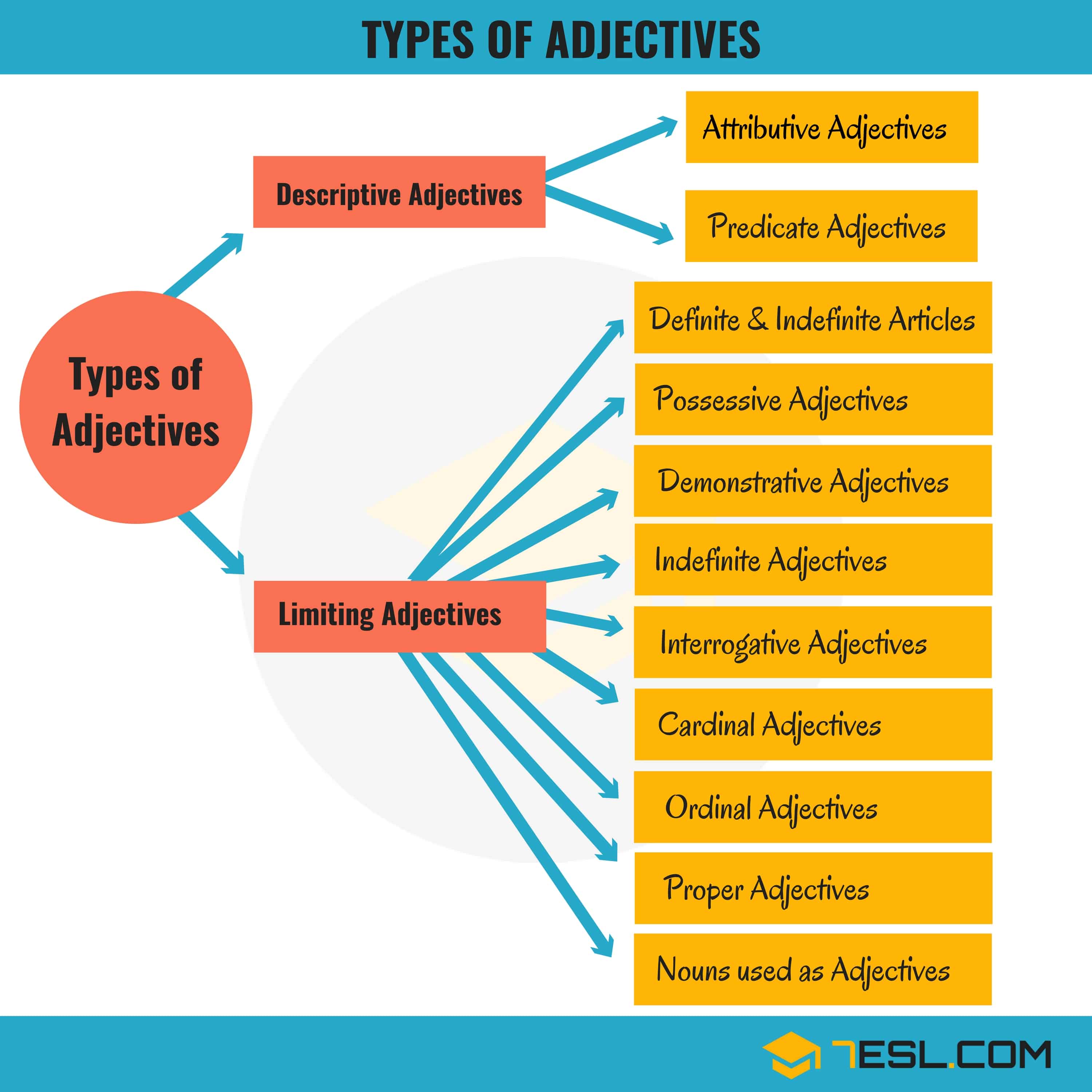Different types of adjectives in English! Learn types of adjectives English students should know with example sentences.
Adjectives modify nouns and pronouns. In general, two main types of adjectives are:
- Descriptive adjectives describe quality of the noun.
- While, Limiting adjectives limit the noun being described.
Types of Adjectives: Descriptive Adjectives
What is a descriptive adjective in English?
Generally, a descriptive adjective is probably what you think of when you hear the word “adjective.” Descriptive adjectives describe nouns and pronouns.
In fact, descriptive adjectives can be attributive adjectives or predicate adjectives.
Attributive Adjectives
Adjectives which appear directly beside the noun, most commonly before, are called attributive, because they attribute a quality to the noun they modify. And, more than one adjective can modify the same noun.
Examples:
The flowers have a nice smell. (“Nice” is an attributive adjective, as it is placed).
The chatter made the room noisy. (This is an instance in which the attributive adjective appears directly behind the noun. “Noisy” is describing the “room.”)
Predicate Adjectives
Adjectives which appear after a linking verb are predicative adjectives, because they form part of the predicate. Hence, they modify the subject of the sentence or clause (a clause is a portion of a sentence which contains a subject and a predicate).
Examples:
The pickles are salty. (noun: pickle, linking verb: are, adjective: salty (describing the noun”pickles”))
Tornadoes appear menacing. (noun: tornadoes, linking verb: appear, adjective: menacing (describing the noun “tornadoes”))
Types of Adjectives: Limiting Adjectives
Limiting adjectives do as their name suggests, they limit the noun being described. Generally, there are nine types of limiting adjectives as follows:
- Definite & Indefinite Articles
- Possessive Adjectives
- Demonstrative Adjectives
- Indefinite Adjectives
- Interrogative Adjectives
- Cardinal Adjectives
- Ordinal Adjectives
- Proper Adjectives
- Nouns used as Adjectives
Definite & Indefinite Articles
There is only one definite article, the. When used before a noun, it specifies a particular noun as opposed to any one.
Examples:
The cat (a specific, identifiable cat)
The cottages (specific, identifiable cottages)
There are two indefinite articles, a and an. These are used with a noun when a specific noun is not being pointed at.
Examples:
A lion (any lion)
An ant (any ant)
Possessive Adjectives
The possessive adjectives my, your, his, her, its, our, and their modify nouns by showing possession or ownership.
Examples:
I forgot my key at home.
What is your phone number?
The bookstore sold his favorite book.
After many years, they returned to their homeland.
We’ll make our decision and contact the people involved.
The cat chased its ball down the stairs and into the backyard.
Demonstrative Adjectives
What are demonstrative adjectives in English?
The demonstrative adjectives “this,” “these,” “that,” “those,” and “what” are identical to the demonstrative pronouns, but are used as adjectives to modify nouns or noun phrases.
Examples:
That dog is so adorable.
He lives in this house.
My friend preferred those plates.
These books are too expensive.
The relationship between a demonstrative adjective and a demonstrative pronoun is similar to the relationship between a possessive adjective and a possessive pronoun, or to that between a interrogative adjective and an interrogative pronoun.
Interrogative Adjectives
What is an interrogative adjective in English?
An interrogative adjective (“which” or “what”) is like an interrogative pronoun, except that it modifies a noun or noun phrase rather than standing on its own (see also demonstrative adjectives and possessive adjectives).
Examples:
Which method is likely to produce the best results?
What subject did you enjoy most?
Indefinite Adjectives
What is an indefinite adjective in English?
An indefinite adjective is similar to an indefinite pronoun, except that it modifies a noun, pronoun, or noun phrase.
Examples:
Many people continue to ignore warnings about the dangers of sunbathing.
The examiners can pitch on any student to answer questions.
There were a few people sitting at the back of the hall.
All children should be taught to swim.
Cardinal Adjectives
Adjectives that modify the noun by numbering it (stating how many) are cardinal adjectives.
Examples:
Five pens
Six tables
Ordinal Adjectives
An ordinal adjective indicates the position of a noun in a series.
Examples:
The first date
The third month
Proper Adjectives
Adjectives derived from proper names are called proper adjectives. They are easily recognizable in that they are always capitalized.
Examples:
Japanese food
Russian opera
Nouns Used as Adjectives
Sometimes nouns can be used as adjectives to define or describe another noun.
Examples:
The computer exhibition
A history teacher









0 Comments